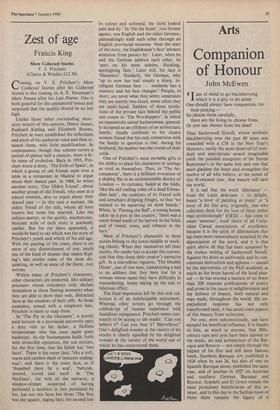Zest of age
Francis King
More Collected Stories V. S. Pritchett (Chatto & Windus £12.50)
Coming on V. S. Pritchett's More Collected Stories after his Collected Stories is like coming on A. E. Housman's More Poems after his Last Poems. One is both grateful for the unexpected bonus and surprised that the quality should be no less high.
Unlike those other outstanding short- story writers of this century, Henry James, Rudyard Kipling and Elizabeth Bowen, Pritchett at once established the inflections and pitch of his authorial voice and then re- tained them, with little modification. In consequence, though this volume covers a period of almost half a century, there is lit- tle sense of evolution. Back in 1935, Prit- chett wrote a story, 'The Evils of Spain', in which a group of old friends meet over a table in a restaurant in Madrid to argue about their shared past. In 1969, he wrote another story, 'Our Oldest Friend', about another group of old friends, who meet at a school reunion, also to argue about their shared past — in this case a woman, the oldest friend of the title, whom all have known but none has married. Like the subject-matter, so the quirky, mischievous, buoyant style of each story is markedly similar. But for the dates appended, it would be hard to say which was the story of Pritchett's youth and which of his old age. With the passing of the years, there is no sense of any diminishment of zest, much less of the kind of despair that makes Kipl- ing's last stories some of the most dis- quieting, as well as some of the finest, ever written.
Within many of Pritchett's characters, other characters are immured, like solitary prisoners whose existences only declare themselves at those fleeting moments when they are able to show their wan, distracted faces at the windows of their cells. At those moments, armed with a telephoto lens, Pritchett is there to snap them.
In 'The Fly in the Ointment', a poorly paid lecturer at a provincial university pays a duty visit to his father, a feckless businessman who has once again gone bankrupt. As the businessman holds forth with invincible optimism, the son notices, for the first time, that his father has 'two faces'. There is the outer face, 'like a soft, warm and careless daub of innocent sealing- wax'; and there is the inner face, as if 'thumbed there by a seal', 'babyish, shrewd, scared and hard'. In 'The Necklace', the wife of the narrator, a window-cleaner suspected of having purloined a necklace in fact purloined by her, has not two faces but three: 'The first was the square, raging face; the second lost
its colour and softened; the third looked pale and sly.' In 'On the Scent', two former agents, one English and the other German, painstakingly stalk each other through an English provincial museum. Near the start of the story, the Englishman's face 'attracts attention from passers by.' Later, when he and the German address each other, he `puts on his most asinine, blushing, apologising face.' Later still, his face is `blameless'. Similarly, the German, who `up to now has had simply a sharp, in- telligent German face ... suddenly has a memory and his face changes.' People, in short, are never what they seem; sometimes they are merely two-faced, more often they are multi-faced. Saddest of these revela- tions of the private face behind the public one comes in 'The Worshippers', in which an expensively suited businessman, general- ly accepted as an offshoot of an aristocratic family, finally confesses to his closest woman friend that his only connection with the family in question is that, during his boyhood, his mother was the cousin of their cook.
One of Pritchett's most enviable gifts is his ability to place his characters in settings as vivid as themselves. Thus, in 'The Ac- companist', there is a brilliant evocation of a shabby flat in an unfashionable district of London — its curtains, faded at the folds, 'like the old trailing robes of a dead Edwar- dian lady', the cushions of its frayed sofa and armchairs dripping fringes, so that 'we seemed to be squatting on dyed beards.' When, in 'Passing the Ball', a young locum takes up a post in the country, 'there was a warm bread smell of the harvest in the fields and of tweed, roses, and tobacco in the bars.'
Most of Pritchett's characters in these stories belong to the lower-middle or work- ing classes. When they themselves tell their stories, the reader has to accept the conven- tion that they share their creator's narrative gift. In a marvellous vignette, 'The Double Divan', one of two men, transporting a bed to an address that they have lost for a woman whose name they have difficulty in remembering, keeps taking up the tale to hilarious effect.
The final impression left by this rich col- lection is of an indefatigable enjoyment. Whereas other writers go through the rubbish-tip of human experience with fastidious repugnance, Pritchett seems con- stantly to be saying to the reader: 'Can you believe it? Can you beat it? Marvellous!' One's delighted wonder at the variety of his stories is clearly equalled by his delighted wonder at the variety of the world out of which he has constructed them.


































 Previous page
Previous page